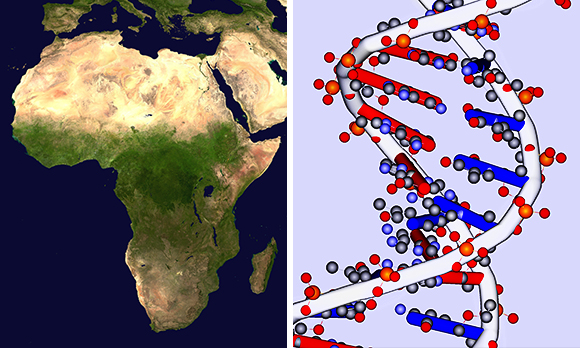
images: NASA, via Wikimedia Commons; Geoff Hutchison [CC BY-ND 2.0], via Flickr
Abasi Ene-Obong, founder and CEO of a pioneering African genomics start-up company, speaks in this exclusive interview about consent, capacity, and who will control the data.
Earlier this month investors teamed up to inject US$4.5 million into 54gene, a genomics company based in Nigeria and the United States that wants to create Africa’s largest biobank.
The company’s vision is to create the largest database of genomic and phenotypic data from Africans, who are currently under-represented in genomic datasets. The data, that focus on cancer, cardiology, neurology, endocrinology and sickle-cell disease, will be scoured for drug discovery opportunities that the company says will improve the availability of quality medicines.
54gene, so named because Africa has 54 countries, is already collecting biological samples from volunteers at 10 hospitals in Nigeria, which jointly see nearly 2 million patients come through their doors every year. The company wants to take its effort to the rest of the continent, and is already speaking with governments in West and East Africa, says founder and director Abasi Ene-Obong.
But what will 54gene do with the data it collects? And what safeguards are in place to protect the privacy of the individuals who volunteer their data? Research Africa spoke to Ene-Obong, who has a PhD in cancer biology, to find out.
How do you source patients?
In our 10 Nigerian hospitals we have over 50 doctors, most of whom are consultant doctors and specialists in the disease areas that we target. They have been educated on what we are looking for and what we’re doing, and they help us recruit. They engage with the patients and get informed consent.
What kind of consent do you obtain?
We get broad consent, and also the ability to re-contact patients. The patients are informed about what we are looking to do for the study. The information is translated into different languages. It’s voluntary, no-one is forced. Nobody is penalised for not joining, and they can always pull out their samples whenever they want.
What sort of information do you collect?
When we get the samples we access patients’ case files. We pull out clinical information from this into our database. We also have a questionnaire about family history.
Who can use the data, and for what purposes?
Our goal is to cater for academic research as well as commercial interests. There’s a balance to achieve there. We set up a research committee in Nigeria when we started collecting samples, and an advisory committee. The goal is that some of the researchers who help us collect samples will get data to carry out world-class research. This is a way of incentivising the doctors.
Where are the samples analysed?
At the moment, for the Nigerian samples, we have a physical biobank in Lagos and we get the samples stored there. We do the DNA extraction in-country. For a country like Nigeria this is a first: DNA or capabilities have not been around until now. We then export the DNA for analysis. Some of it happens in the United States. Nigerian law allows that. However, this is going to vary by country as we expand.
Is that a satisfactory set-up, long-term?
Our ideal vision is to do everything on the continent. But one of the problems is that there is no support, even for genotyping. But we’re building some capacity. We have built the biobank, and a lab attached to it that will perform genetic analysis. It will carry out genetic testing cheaply. Our idea is not to make money for that, but to build relationships with our hospitals. The next step will be to increase investment on the lab side to begin to do some of the more advanced techniques.
Where is the data hosted?
Currently, the data is hosted on the cloud. But depending on the country, if they have specific requirements about where the data is hosted, we’ll have to customise the data storage solutions.
How have you dealt with privacy concerns?
We are compliant with both the European Union’s General Data Protection Regulation and the United States Health Insurance Portability and Accountability Act. It’s in our best interest to follow all required international regulations. If we don’t, our potential partners would not want to touch our data. We’re also keeping tabs on national privacy laws around Africa. One of the things we are looking to do is to engage with policymakers.
Why?
Some countries in Africa hope to become hubs for personalised medicine. They need to understand that their policies will make or break their aspirations. Do we want to be protectionist or do we want to enable research?
Are there any uses of the data you won’t allow?
We don’t sell data for mapping or targeting purposes or to insurance companies. We’ve had all these types of companies contact us. But no, we are purely looking at it from a health and medical perspective.
Will access be controlled by Africans?
Hmm, good question. I think we want to be the voice of Africans. I’m sure we don’t want to do all of this [with] no benefit going back to the continent. That notwithstanding, I don’t think we would preclude non-Africans from being a part of what we’re doing so long as the decisions that are made benefit the people who are giving us the data. The best minds are everywhere and we want the best minds involved in this.
A version of this article also appeared in Research Europe